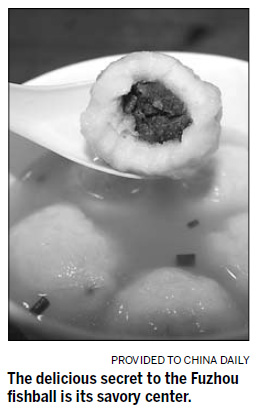Having a ball in Fuzhou
Updated: 2011-09-25 07:56
By Chen Xin (China Daily)
|
|||||||||
 |
Fuzhou
It is a deceptively simple snack. Minced fish is beaten to a springy sponge and formed into little balls that are then dropped in soup. The surprise lies in the heart of it.
As someone born and raised in Chongqing where most of the food is spicy, it has been quite strange to find myself addicted to this relatively bland ball - yuwan, the signature snack of Fuzhou in Fujian province.
It was the first local snack I tasted here since arriving three months ago. Yuwan has played such an important role in Fuzhou cuisine that the locals say: "If there is no yuwan, there is no dinner".
The name does not do it justice. Although many places in Southeast Asia have their own ways of cooking fish balls, the Fuzhou yuwan stands out because of its meat filling.
Made from the minced meat of eel, shark or freshwater fish and beaten into balls, the soft, white and spongy Fuzhou yuwan and its minced pork heart makes for a satisfying, savory meal.
Many restaurants, snack bars and street vendors in Fuzhou serve the dish, and an average bowl of six tennis-ball sized fish balls costs about 6 yuan ($1).
At Yonghe Yuwan, a famous chain store in Fuzhou, a local chef told me it is easy to make fish balls at home and many people cook it at home. He taught me how to make it.
First, carefully remove all bones from the fish, and combine the scraped meat with flour, salt and seasoning. The mixture is then beaten into a smooth consistency and then kneaded into balls with a stuffing of minced meat, shrimps and seasoning.
Some pepper added to the mix will get rid of any fishy smell.
The bowl of fish ball soup may look unadorned with the white balls accented only by a scattering of green spring onions, but it is delicious.
I did not know why I had become so quickly fond of the dish until my father told me recently that my ancestors had come from Fujian about 200 years ago. Perhaps it's genetic memory and I have fish balls in my blood.
There is also an anecdote about the origins of the dish. Emperor Qin Shihuang (259-210 BC), who first unified China, loved fish but hated fish bones. They say he once traveled south where all the tastiest fish were, and asked to be served fish. Knowing the emperor's reputation, a local chef fearful for his own safety hit upon a fail-proof plan. He removed all the bones from the fish and smashed it up with the back of his cleaver. He then formed the fish paste into balls with a meat filling hidden inside.
Qin Shihuang liked the dish very much, and it became very popular in southern China, right up to today.
You can contact the writer at chenxin@chinadaily.com.cn.











